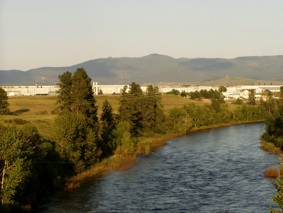Kaiser Aluminum’s Trentwood Works
&
Spokane River PCBs
Kaiser Aluminum’s Trentwood Works is responsible for some of the most substantial and uncontrolled PCB pollution in the Spokane River. Kaiser Trentwood has been identified as one of the pollution sources that must be controlled as part of the Spokane River PCB cleanup process.
Historically, the Trentwood Works started as a wartime aircraft parts manufacturing facility owned by the U.S. government. The Kaiser Company then purchased the site in the 1940s, and has since manufactured flat-rolled aluminum sheeting and plating.
The aluminum manufacturing process utilizes a number of toxic chemicals, including PCBs until they were banned in 1977. Significant quantities of PCBs have leaked from the on-site landfills at the Kaiser plant into the soils and groundwater at the site. PCBs are described as “floating” atop the aquifer below the Trentwood plant.
The quantities of PCBs contained in the soils and groundwater below Kaiser Trentwood exceed federal and state standards. There have been a number of documented pollution events at the Kaiser Trentwood plant, along with a number of cleanup efforts, many of which have proved to be inadequate. (See chronology)
In 2002, Kaiser filed for bankruptcy. The bankruptcy court declined to discharge debts related to Spokane River environmental cleanup, and Kaiser may be held liable for as much as $74 million in cleanup costs associated with Spokane River pollution.
In 2005, following the bankruptcy court ruling, Kaiser agreed to prepare a cleanup plan for PCB contamination of soils and groundwater at the Trentwood site.
In 2003, Kaiser disclosed that it had released more than 100 pounds of PCBs into the Spokane River. The US EPA human health standard for PCB discharges in effluent is measured at 170 picograms – 170 trillionths of a gram – per liter of water. Despite the shocking quantities of PCBs discharged by Kaiser, the Washington Department of Ecology issued an enforcement order fining the company just $40,000 for – the maximum possible fine. Kaiser appealed and a settlement was reached in 2005. The fine was reduced to $10,000 and Kaiser agreed to make a $30,000 payment to Spokane County to install monitoring wells. No actual cleanup has resulted from the penalty action.
In 2005 Kaiser also agreed to responsibility, along with Avista Corporation, for PCB cleanup at the Upriver Dam site, where heavily contaminated sediments were singled out for corrective action under MTCA. (Inland Empire Paper and Liberty Lake Sewer & Water District may are also potentially liable parties at this site.)
The TMDL draft (March 2006) indicates that effluent from Kaiser’s wastewater pipes includes PCB concentrations 1,080 picograms per liter. These concentrations must be reduced by 99% to meet downstream water quality standards.




